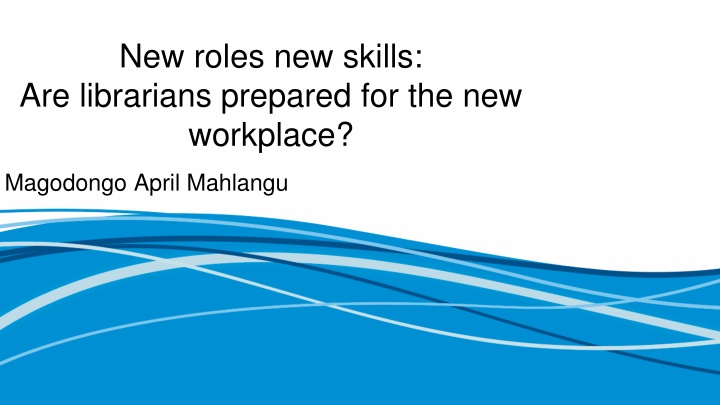
Librarians' Readiness for the New Workplace: Skills and Trends
Explore the evolution of university libraries towards the Library 4.0 model, analyzing current trends, technologies, and responses of South African public university libraries. Delve into the impact of AI, IoT, RFID, robotics, and big data on library operations and services, as well as the development of new skills for librarians in the digital era.
Download Presentation

Please find below an Image/Link to download the presentation.
The content on the website is provided AS IS for your information and personal use only. It may not be sold, licensed, or shared on other websites without obtaining consent from the author. If you encounter any issues during the download, it is possible that the publisher has removed the file from their server.
You are allowed to download the files provided on this website for personal or commercial use, subject to the condition that they are used lawfully. All files are the property of their respective owners.
The content on the website is provided AS IS for your information and personal use only. It may not be sold, licensed, or shared on other websites without obtaining consent from the author.
E N D
Presentation Transcript
New roles new skills: Are librarians prepared for the new workplace? Magodongo April Mahlangu
Presentation structure Evolution of university libraries Library 4.0 model Current Trends in SA public university libraries Responses of SA public university libraries to Library 4.0 technologies Workplace skills in the Library 4.0 era Approaches for new skills Roles and responsibilities that various stakeholders play in the development of workplace skills
Evolution of university libraries Library 4.0 21st century E-books 19th century 1984 14th century 1st century AD
Library 4.0 Model Context- Aware Technology Intelligent Library Creative space State-of-the- art display Open Source Massive Data Cloud Service Augmented Reality Librarian 4.0. (Noh, 2015)
Current Library 4.0 trends Artificial Intelligence (AI) Chatbot used to answer user queries Internet of Things (IoT) technologies are used for targeted communications AI improves operational efficiency of libraries by optimizing collection analysis, visualization, preservation and reducing expenses associated with service delivery Wi-Fi devices are tracked to show traffic patterns and identify popular shelves to make better informed space usage decisions RFID for circulation and shelf management Robots for automated storage and retrieval systems (ASRSs) which can help in the area of library space management Big data technology is used to provide personalized knowledge service, decision-making, studying users behaviour, etc. Tella, (2020); Tella & Kadri (2021); Vander Walt, (2019)
Responses of SA public university libraries to Library 4.0 technologies Tutorials (video) E-catalogue Wi-Fi Off-campus access Digital scholarship Ask-a-librarian Research commons Research data services Services to differently abled Group study areas Open scholarship Social media Makerspace Information literacy UX (e.g. evaluations) Borrowing ICTs (e.g. laptops) Reference management tools E-resources Library as a publisher Libguides Off campus access (77%) scoring Robotics/AI Ocholla & Ocholla, (2020)
Workplace skills in the library 4.0 era Raju, (2017); Chan & Chan, (2018); Ahmad et al (2019); Tella, 2020
The top 10 skills Digital Creativity Collaboration Problem solving Analytical Critical thinking Leadership Preservation Facilitation Teaching
Ways to address the skills gap Providing job seekers with the skill to contribute to a global community Increasing awareness Attitudes and response to global knowledge Increasing sustained collaboration between HEIs and stakeholders Lichy & Khvatova, 2019
Approaches to training for the digital age Continuing educational programmes Short courses Workshops Placements On site visits Short in-house courses Formal library and information science programmes Chiware, 2007
Stakeholder Roles and Responsibilities for development of workplace skills Fisher, (2004)
Conclusions Academic libraries has evolved beyond recognition and technology has always been the driver for that change There has been a lot of studies following the Noh s Library 4.0 model The current trends in academic libraries show a slow pace in adoption of library 4.0 technologies, especially in the South African context Digital, creativity, collaboration, problem solving, analytical skills were the most mentioned skills in the literature All stakeholders will have to play
Recommendations Librarians will have to equip themselves with new skills in order to remain relevance in the new era Educators in LIS schools to review their curriculum and align it with Library 4.0 skills set The academic libraries will have to find ways to recruit or reskill librarians with new skills Redesigning of information literacy programme to include new literacies such as data literacy, digital literacy and research literacy Further research is needed on how can libraries incorporate these technologies in their service offerings
